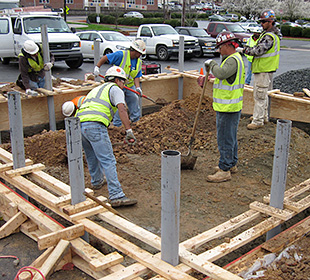Aug. 19, 2015
Triangle Clean Cities Resource Gives CNG Installation a Boost
Although North Carolina has 23 public natural gas fueling stations and many vehicle fleets using this fuel, we are still in the early stages of adoption. This project enabled us to incorporate many voices into the guide.
When the Triangle Clean Cities Coalition (TCCC) set out to promote compressed natural gas (CNG) fueling stations in North Carolina, its first step was to identify the issues people faced during CNG installation, and then overcome them by providing helpful guidance. This resulted in the coalition's online publication, Planning and Installation Guide: North Carolina Compressed Natural Gas Fueling Stations.
To identify the most useful information for the guide, TCCC—which covers the Raleigh, Durham, and Chapel Hill area—relied on interested parties from across the state. Input for the guide came from fleet managers, fueling equipment manufacturers, vehicle manufacturers, and natural gas utilities. End users identified the installation process as one of the biggest CNG barriers they face. More specifically, the participants wanted advice about process schedule, funding mechanisms, and the necessary components of putting together a request for proposal (RFP).
Armed with this information, TCCC worked with North Carolina's major natural gas utilities, PSNC Energy and Piedmont Natural Gas, to develop a station installation guide. The guide provides details about existing CNG infrastructure in the state, working with utilities, what to expect during the permitting and inspections process, and other information specific to North Carolina.
Another challenge was the experience that fleets had installing natural gas stations varied widely, according to TCCC Coordinator Lacey Jane Wolfe. However, this diversity was put to good use when North Carolina fleet managers were asked to provide input on the guide's content.
"Although North Carolina has 23 public natural gas fueling stations and many vehicle fleets using this fuel, we are still in the early stages of adoption," Wolfe said. "This project enabled us to incorporate many voices into the guide. It was challenging to include such a wide variety of approaches and funding mechanisms and still keep it succinct, but we ended up with a much better product than we would have otherwise."
Developing the installation guide was part of an Alternative Fuel Implementation Team project led by the North Carolina Clean Energy Technology Center. The guide is now part of the Alternative Fuel Implementation Toolkit website.
"The installation guide has received very positive reviews from stake-holders across the state," Wolfe said. "The North Carolina Department of Public Instruction has even included the publication in a report to the Joint Legislative Energy Policy Commission."
